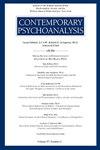Abortion as a Catalyst
IF 0.2
4区 心理学
Q4 PSYCHIATRY
引用次数: 0
Abstract
AbstractIn both what has and has not been published in the psychoanalytic literature about abortion, those who elect abortion have been devalued. The omission of abortion perpetuates its sense of unimportance in our field. Where it features, it is relegated to a category of conflict colored by pathology and trauma. To the contrary, abortion can be experienced as a generative event. Interviews with ten women who underwent abortion reveal important themes that are underrepresented in existing theory. These women offered windows into their lives both before and after their abortions in a way that framed their abortions as pivotal turning points. I propose the possibility of viewing abortion as a catalyst for psychological growth, and discuss related clinical considerations.Keywords: abortionpregnancymotherhoodinfertilityterminationcreativity This article is part of a series including: Notes1 Participants were recruited through referrals generated by posts on professional listservs. I had no prior relationships with any of the participants. The salient inclusionary criteria consisted of experiences with both abortion and motherhood. While most participants reported trauma histories, these were not part of the selection criteria. It is worth considering whether certain psychological experiences, such as unresolved trauma, may have motivated self-selection into the study.2 See Castro (Citation2022). https://www.livescience.com/18629-pregnant-monkeys-miscarry-avoid-infanticide.html.3 See https://www.northgeorgiazoo.com/zoo-am-i-blog/ask-a-zookeeper-sacrificing-babies).4 See Burgess (Citation2020). https://www.abc.net.au/news/2020-04-03/why-tasmanian-devils-born-in-april/12114878).Additional informationNotes on contributorsIsheh BeckIsheh Beck, Psy.D., is a psychologist in Philadelphia and a psychoanalytic candidate at New York University’s Postdoctoral Program in Psychotherapy and Psychoanalysis. She serves as Director of the Philadelphia Society for Psychoanalytic Psychology. Her clinical work centers on issues involving female embodiment, mother-daughter relationships, and biculturalism—particularly with those of Iranian descent.堕胎作为催化剂
在关于堕胎的精神分析文献中,无论是已经发表的还是尚未发表的,那些选择堕胎的人都被贬低了。对堕胎的遗漏使其在我们的领域中一直被认为是不重要的。在它的特点,它被降级为一类冲突的病理和创伤。相反,堕胎可以作为一个生育事件来体验。对10名堕胎妇女的采访揭示了在现有理论中未被充分代表的重要主题。这些妇女提供了了解她们堕胎前后生活的窗口,以一种将堕胎作为关键转折点的方式。我建议将堕胎视为心理成长的催化剂,并讨论相关的临床考虑。关键词:人工流产怀孕生育生育终止创造力本文是一系列文章的一部分,包括:注1参与者是通过专业列表服务器上的帖子产生的推荐而招募的。我之前和任何参与者都没有关系。突出的纳入标准包括堕胎和做母亲的经历。虽然大多数参与者报告了创伤史,但这些并不是选择标准的一部分。值得考虑的是,某些心理经历,如未解决的创伤,是否可能在研究中激发了自我选择参见卡斯特罗(Citation2022)。https://www.livescience.com/18629-pregnant-monkeys-miscarry-avoid-infanticide.html.3参见https://www.northgeorgiazoo.com/zoo-am-i-blog/ask-a-zookeeper-sacrificing-babies).4参见Burgess (Citation2020)。https://www.abc.net.au/news/2020-04-03/why-tasmanian-devils-born-in-april/12114878).Additional information贡献者说明:sheh Beck, p.d.。他是费城的一名心理学家,也是纽约大学心理治疗和精神分析博士后项目的精神分析学候选人。她是费城精神分析心理学协会的主任。她的临床工作集中在涉及女性化身、母女关系和双文化主义的问题上,尤其是那些伊朗血统的问题。
本文章由计算机程序翻译,如有差异,请以英文原文为准。
求助全文
约1分钟内获得全文
求助全文

 求助内容:
求助内容: 应助结果提醒方式:
应助结果提醒方式:


